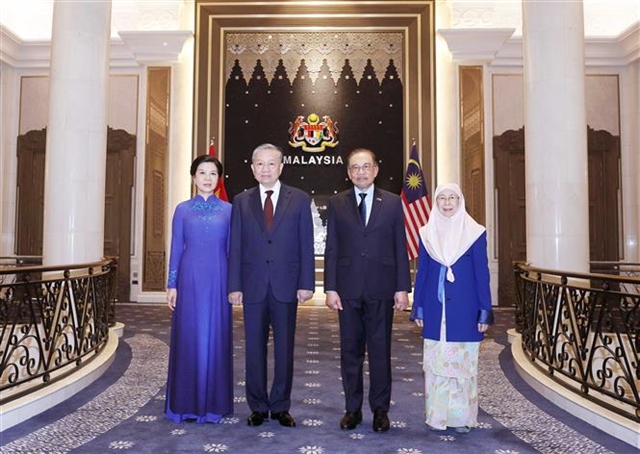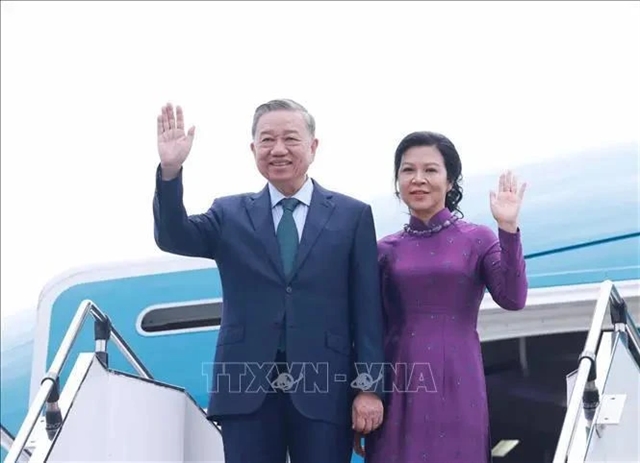 Politics & Law
Politics & Law

 |
| Party General Secretary Tô Lâm and his spouse leave Kuala Lumpur for Hanoi, concluding their three-day official visit to Malaysia. — VNA/VNS Photo |
HÀ NỘI — Lê Hoài Trung, Secretary of the Party Central Committee and Chairman of its Commission for External Relations, has talked to the press regarding the outcomes of Party General Secretary Tô Lâm’s three-day official visit to Malaysia, which concluded on November 23.
According to Trung, the visit, Lâm’s first in his new role as the Party General Secretary, achieved profound and practical results. While in Malaysia, the delegation engaged in 18 key activities, including extensive talks with Malaysian leaders as well as meetings with major corporations and with representatives of the overseas Vietnamese community.
The Party chief delivered a policy speech at the prestigious University of Malaya, outlining Việt Nam’s vision for future relations with Malaysia and for a united, prosperous ASEAN Community. His remarks also underscored the fact that Việt Nam has attached importance to ASEAN. Meanwhile, the leader’s spouse and the wife of the Malaysian Prime Minister exchanged views on women’s advancement in both countries.
Party General Secretary Tô Lâm and Malaysian PM Anwar Ibrahim agreed to elevate the bilateral relations to a Comprehensive Strategic Partnership and issued a joint declaration on this upgrade, affirming their commitments to supporting each other on the nations’ respective development paths. Việt Nam and Malaysia are now each other's only comprehensive strategic partners in Southeast Asia, providing a critical framework and orientation for bilateral cooperation in the new era focusing on four key pillars, namely enhancing cooperation in politics, defence, and security; strengthening economic connectivity for sustainable development; exploring new cooperative areas such as digital transformation, clean energy, and advanced technologies; and deepening coordination on international and multilateral issues.
Discussing domestic and global issues, the two sides’ leaders stressed the two countries’ historical and cultural similarities as well as common goals in development, which could foster greater political trust and deeper collaboration between the Communist Party of Việt Nam and Malaysia’s major political parties.
They agreed to work together to build a cohesive and prosperous ASEAN Community, with the Party leader underscoring Việt Nam’s strong support for Malaysia’s ASEAN chairmanship in 2025.
Trung went on to note that during the visit, the leaders of both nations highlighted the importance of maintaining peace, security, stability, and safety and freedom of navigation and overflight in the East Sea, not using or threatening to use force, and resolving disputes through peaceful means in accordance with the United Nations Convention on the Law of the Sea (UNCLOS) 1982.
He said the visit garnered significant attention from the Malaysian media, particularly regarding the decision to elevate the bilateral relations. The outcomes of the trip are of great significance, helping both sides further harness their cooperation potential, leverage their respective strengths, and make contributions to strengthening a peaceful environment conducive to the new phase of national and regional development.
Regarding future directions to build on such significant outcomes, Trung stressed that the initial task for relevant agencies in both countries is to promptly concretise the framework of the newly established Comprehensive Strategic Partnership through the development of a comprehensive action plan, while reviewing and advancing necessary agreements to create an effective collaboration mechanism.
Based on this plan, ministries and sectors involved should quickly devise specific programmes to further traditional areas of cooperation while placing particular focus on new and emerging fields such as green economy, innovation, science and technology, digital transformation, and green energy.
Relevant agencies should also regularly review, monitor, and evaluate the implementation of these plans and programmes to ensure that agreements are effectively translated into reality, serving the developmental goals of both nations in the new era.
The Party official expressed his hope that the two sides will continue to increase exchanges, sharing, and interactions through state, party, and people-to-people channels to nurture and enhance their bonds and solidify a foundation for the robust development of the bilateral relations in the future. VNS




